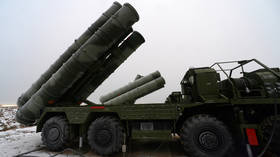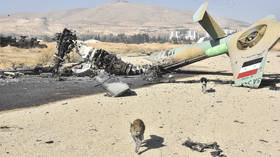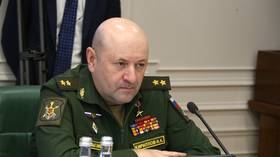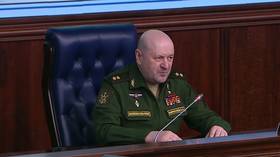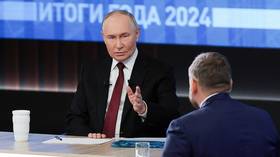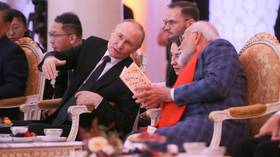Whopping victory for Putin`s party
The United Russia party, headed by President Vladimir Putin, has won a resounding victory in the country's parliamentary election. With almost 98% counted, United Russia has 64.1% of the vote. Meanwhile, international observers from the OSCE and Council o
Results show the Communists, the Liberal Democrats and Fair Russia will join United Russia in the State Duma.
The election had a record high turnout of 63% of eligible voters.
Putin wants Duma to convene early
Claims of violations
High voter turnout
Thousands rally in Moscow after election
Putin wants Duma to convene early
President Putin wants the new State Duma to convene ahead of schedule. The order for an appropriate decree came at a meeting with Kremlin Cabinet ministers.
“I think it will be right not to wait for the deadline specified by the law – that is 30 days before the State Duma convenes for its first session. The law does allow that to happen earlier and that's what we're going to do. I ask the administration to prepare a decree that will allow the State Duma to convene before that deadline, and together with the government we will begin our work,” he said.
The Russian President has also thanked those who voted for the United Russia party and said the parliament poll showed that people trust him.
Boris Gryzlov, the leader of the United Russia party, says the victory is a mandate for more work on social needs, higher pensions, better salaries and what are called “the national projects”.
“United Russia will continue the work of the national projects such as medical care, housing, education, agriculture, the demographic problem, support for some economic sectors, such as aircraft and shipbuilding, space, nuclear energy and others,” Gryzlov said.
The United Russia party says it will nominate its presidential candidate for the 2008 election at its congress on December 17.
While the Central Election Commission says there's no doubt about the legitimacy of the vote, members of the Parliamentary Assembly of the Council of Europe stated that the State Duma elections failed to meet international standards.
“Could I first say that our central conclusion is that these elections failed to meet many of the commitments and standards we have in the OSCE and the Council of Europe. By that we say that it's not a fair election,” said the OSCE Parliamentary Assembly Chairman, Goran Lennmarker.
Meanwhile, the leader of the Communist Party, Gennady Zyuganov, said that his party's observers reported a number of violations. He says United Russia is tampering with the results.
“We don’t trust these results. We will continue with our own count of the votes at all polling stations. The figures we have for Siberia and other key regions are different from the official ones. Pretty soon we’ll make this information available to you,” Zyuganov said.
“We believe the results are being tampered with to bring them in line with pre-determined figures: a 60% turnout and more than 60% of the vote for United Russia. This will allow them to make Putin ”national leader“ of Russia”, he added.
Meanwhile, one of the opposition leaders, former World chess Champion Garry Kasparov said that his Other Russia movement had noted numerous examples of fraud.
Andrey Przhezdonsky, a Public Chamber member in charge of electoral rights, has confirmed that some complaints about ballot violations have been received.
“Regarding particular violations, quiz games were organised at some of the stations in the city of Chelyabinsk. In the republic of Bashkortostan, voters complained that observers were not let in, and there were cases where three or four people entered the booth at a time,” Mr Przhezdonsky said before adding: “When we received the complaints we immediately informed the central election committee. So we did our best to react as effectively as we could.”
Some analysts say criticism of the Russian election by some observers may simply be due to prejudice and a reflection of western interests.
“We have seen this over many years how election observers from the big organisations reflect the foreign policy imperatives of the major western states. In this Russian election the main human rights organisation of the OSCE announced in advance of the elections that it didn’t have enough time to observe them properly. And yet at the same time another party of the same organisation did send observers even though their own colleagues had said they hadn’t enough time to observe them properly,” said John Laughland, a political analyst.
“I actually do not think that observation of election these days makes too much sense since the results of the monitoring are too often too predictable,” said Vyacheslav Nikonov, a political analyst.
The CEC say if they manage to work fast enough the official results can be expected as early as next Saturday, December 8. So it's possible that the new State Duma will gather and start its work before the New Year. According to the Constitution the CEC has no more than 30 days after the election day to finalise the results.
High voter turnout
On Sunday the electorate voted across Russia's eleven time zones. From Vladivostok to Moscow and on to Kaliningrad, the election in Russia lasted for 20 hours and spanned 85 regions. It's been a massive logistical task to hold elections in the world’s biggest country, but apart from its political implications, it's also been a rare opportunity to witness people across 11 time zones acting as one.
Vladivostok, the capital of the Primorsky region, the largest Pacific port and home to the naval fleet, was one of the first major Russian cities to open polling stations.
In Moscow, voters usually wait until late afternoon to go to the polls, but not the President. Vladimir Putin and his wife Ludmila voted just after noon at what must be the most hi-tech polling station at the country. Like an ordinary voter, the President was asked to show his ID and even got a mild reprimand.
The man who is often credited with bringing elections to Russia also came to the polls. The first President of the Soviet Union, Mikhail Gorbachev, had a chat with the election officials and said he hoped the vote would be successful.
One man who doesn’t appear to share this hope was Garry Kasparov. The former World Chess Champion turned opposition leader came to a polling station together with his associate Eduard Limonov, the leader of the outlawed National Bolsheviks movement. Neither is running for parliament after failing to register their groups as political parties, but that didn’t stop them from invalidating their ballots.
Thousands rally in Moscow after election
Thousands of activists from youth organisations rallied in Moscow to celebrate the United Russia Party's victory in the parliamentary election. Meanwhile, opposition supporters held demonstrations to protest against the results.
With the preliminary results revealed, despite the frosty weather, thousands of Kremlin supporters gathered only metres away from its walls.
They made no secret of what they thought about their president.
“We believe in our president, the leader of the Russian Federation!” a girl said.
“We are the majority and we vote for Putin!” a young man echoed.
Not far away, at a communist rally people were noticeably older. The communists came second in the elections, but they are not happy with the outcome and wasted no time in pointing their fingers.
“The elections were a farce. From the beginning the United Russia election campaign was full of violations,” said Vladimir Ulos, a Communist Party member.
Members and supporters of the runners-up were vocal in their post-election blues. They say there was no respect for the election process. Like Vladimir Ulos, they believe people are prepared to commit any kind of crime to hold on to power.
Meanwhile, the radical opposition movement the Other Russia appealed for democracy outside the Central Election Commission.
As people across the political spectrum voiced their opinions there were scuffles, but no injuries.
While to some the election result came as no surprise and led to celebrations, others got a reality check and the frustration of losing. In any case, the voting is over and the final results will soon be announced, and the shape of the next Russian parliament has been decided for the next four years.
On December 2, RT correspondents have been reporting on the election from across France, the United Kingdom, the United States, the Middle East and Russia: in the Siberian city of Kemerovo to the Republic of Chechnya in the Caucasus, the Far East, and Georgia's breakaway region of Abkhazia, where many residents have Russian citizenship.


